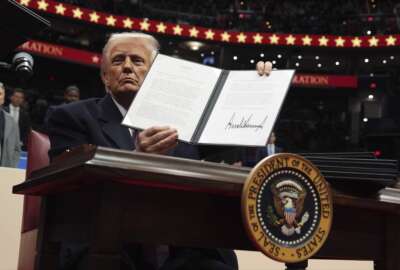Lawmakers unveil Hatch Act update
A group of lawmakers has proposed an update to the law governing federal employees' political activity that would exempt some state and local employees and allow...
A group of lawmakers has proposed an update to the law governing federal employees’ political activity. The Hatch Act Modernization Act of 2012, introduced by Sen. Daniel Akaka (D-Hawaii) and Rep. Elijah Cummings (D-Md.), exempts state and local employees from a ban on running for political office and would allow for a range of penalties other than automatic suspension for minor violations.
“These are common-sense changes that will clarify the law and make it easier to enforce,” Cummings said. A number of senators have also joined the legislation as co-sponsors.
The 1939 Hatch Act, which was last updated about 20 years ago, limits federal employees’ political activity — in many cases, even when they’re off the clock.
However, the law has had far-reaching, perhaps unintended, consequences.
For example, local officials with only tenuous connections to the federal government — through federal funding, for example — are still bound by the law’s prohibition on seeking political office in partisan contests.
Critics of the law also point to its severe penalties. Employees found in violation of the Hatch Act are automatically fired, regardless of the severity of the breach. The proposed law would allow the Merit Systems Protection Board, which rules on Hatch Act complaints, greater flexibility to issue a “range of penalties.”
| Proposed Hatch Act changes:
— Allows state and local government employees covered by the law to run for office. — Allows MSPB greater flexibility to consider range of punishments rather than automatic firing. — Considers D.C. employees, who are now treated the same as federal employees, under same rules as state/local employees. |
Sponsors of the legislation say both changes to the law are needed and long past due.
“State and local employees, such as police officers, should not be banned from running for public office,” Cummings said, “and there should be punishments less severe than firing for minor violations.”
Sen. Joseph Lieberman (I-Conn.),a co-sponsor of the bill, said lifting the ban on running for local office “would help expand the pool of dedicated and talented public servants running for state and local office and focus scarce resources on more serious investigations.”
‘Desperately needs to be updated’
The Hatch Act was designed to make sure federal resources weren’t being diverted toward political purposes and that bosses weren’t arm-twisting employees into participating in partisan activities.
But the Office of Special Counsel, which investigates Hatch Act violations, has long argued for an update. The head of the OSC, Carolyn Lerner, told Federal News Radio in October the law currently on the books risks becoming an anachronism in the age of social media and “desperately needs to be updated.”
In fact, the bill introduced by Akaka and Cummings closely tracks recommendations OSC sent to Capitol Hill last year.
Mike Lee (R-Utah), the sole Republican to sign on to the update, so far, said the bill has the potential to garner broader bipartisan support.
“If we can update the Hatch Act to provide for greater flexibility for public workers while still ensuring the legitimacy of our politics, there should be no reason for anyone to oppose such a change,” Lee said.
The proposed bill would also treat Washington, D.C. workers — currently bound by the rules for federal employees — under the same rules as state and local government employees.
RELATED STORIES:
* Analysis: Hatch Act modernization good for feds, better for locals
Office of Special Counsel wants Hatch Act overhaul
Hatch Act overdue for an update say lawmakers
Copyright © 2025 Federal News Network. All rights reserved. This website is not intended for users located within the European Economic Area.





